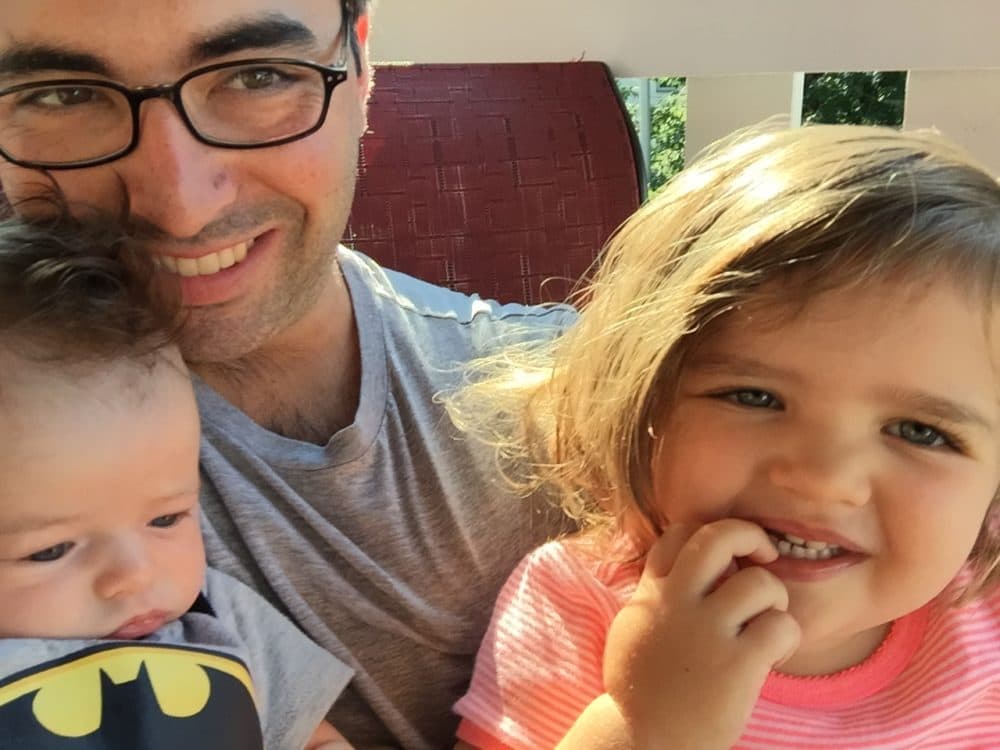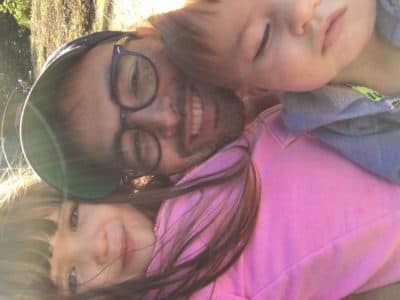Advertisement
Commentary
All Americans deserve paid parental leave

“OK kiddos, I have a question for you.”
My daughter gives me a sideways glance in the rear-view mirror. “A real question or a joke?” she asks as she steps over her brother and into her booster seat.
I look over my shoulder at my son tearing into what’s left of the granola bar I packed in his lunch, and remind him, “Put your seatbelt on, buddy.”
“But what’s the question?” he asks as he stretches the strap across his lap.
As we pull out of the school parking lot, I drop it on them. “OK,” I say. “What’s the earliest memory you have of me?”
Two puzzled looks in the rear-view mirror.
I admit it’s a strange question, but I was conducting a kind of two-part experiment. First, I wondered if, being closer in age to infancy — 8 and 6 — my kids could conjure up memories that, by adulthood, will be long forgotten. But mostly, I wanted to know if they remembered me being around in their earliest months and years. I’ve found myself thinking about the tremendous gift it was that I was able to spend so much time with them at home when they were babies. And, I guess I’ve been thinking about this because paternity leave has been in the news recently.
If you’re not up on the latest cable news controversy, let me explain. In September, Pete Buttigieg — formerly “Mayor Pete” now President Joe Biden’s Transportation secretary — and his husband Chasten adopted newborn twins. To spend time with his family, Buttigieg took a paid paternity leave. Then, last Thursday, a Politico newsletter noted Buttigieg “has been MIA” and detailed his leave, which began in mid-August. The right seized on the news, particularly Fox News host Tucker Carlson, who ridiculed Buttigieg and the concept of paternity leave on air, saying, “Pete Buttigieg has been on leave from his job since August after adopting a child. Paternity leave, they call it, trying to figure out how to breastfeed. No word on how that went,” he mocked.
Cue the pundits.
Predictably, his colleagues on the left defended Buttigieg and suggested, as Buttigieg himself has recently, that all Americans deserve the kind of paid leave he enjoyed. (Last week, Meghan Markle joined the chorus, writing to Senate Majority Leader Chuck Schumer and House Speaker Nancy Pelosi in favor of paid parental leave.) On the right, the ridicule raged. Dan McLaughlin, writing for the National Review, noted that Buttigieg is and should be “under fire for this.” His strongest argument against Buttigieg is, literally, that he is a man. “He’s not a mother who gave birth and is breastfeeding a child,” McLaughlin wrote, stating the obvious. “He’s not even assisting a mother who gave birth and is breastfeeding a child,” he continued. McLaughlin insists, “this is not about Buttigieg being gay,” before admitting that he, himself, got time off when his third child was born.
Advertisement
The double standard truly is the most notable thing here. Several news outlets, reporting on Tucker Carlson’s comments, point out that Fox News offers paid paternity leave to employees and at least two of Carlson’s fellow on-air hosts took advantage of the time off, with Todd Piro of “Fox & Friends” going public with his praise of the policy.
I was there for the sleepless nights and bleary days. I was there for the first laughs and first steps.
If nothing else, this non-controversial controversy has created space to discuss the importance of paid family leave in general, and the reasons why paternity leave, in addition to maternity leave, is important.
When my kids were born, Massachusetts had not yet enacted a paid family leave policy. It was a confluence of careful timing and privilege that allowed my wife and I to spend nearly six months at home with each of our newborns.

When our daughter was born in 2013, my wife was an elementary school teacher, and I was working as a part-time lecturer at a college and gearing up to go to back to school for a PhD. Our daughter arrived in early April, which meant that my wife only had to take a few months off from work, and I only had a few weeks of classes to finish up the semester. We spent the next several months in the spare bedroom we converted into a nursery, passing our daughter back and forth, bouncing on an exercise ball to help her sleep, and binge-watching “Lost.”
Two years later, my son arrived a week after my first year of graduate school ended. Having a 2-year-old changed the equation, of course — no hunkering down this time; rather, I strapped my boy into a Baby Bjorn and our family of four took long walks around Boston. Our expenses were minimal because we were living in an apartment owned by my grandmother, and she charged us next-to-nothing for rent.
There are numerous studies out there that indicate just how important these early weeks and months are for the development of children and the attachment they form with their parents. I can attest that the strong bonds I formed with my children were forged in those days and nights that felt long but, in retrospect, were ever so fleeting. I’m just so grateful that I got to be there.
I was there for the sleepless nights and bleary days. I was there for the first laughs and first steps. I was there to read books and sing the entire Simon and Garfunkel catalog, off-key and while bouncing, of course.
That was eight and six years ago now, respectively, but in some ways, it feels much longer. And, it turns out, infancy feels a long way off for my kids, too.
In the car on the way home from school, my son shrugs off my question, more intent on finishing his snack, while my daughter tries earnestly to conjure her earliest memories. After a few seconds, she admits that she can’t distinguish between a genuine memory and the memory of a picture or video that she’s seen from back then. In particular, she’s recalling the time when she was 2 and using a combination of the sign language we’d taught her from infancy and her ever expanding vocabulary to ask for a piece of apple pie. It was cute; I filmed it.
We agree she’s probably remembering the video, and, in the rear-view mirror for a moment she looks sorry that she can’t recall anything. “I guess I don’t remember that far back,” she says.
“I guess not,” I say.
But then, in an instant, her expression changes. She’s smiling as she says, “But you do!”
She caught me off guard with that one. My eyes well up. “I do,” I tell her.
It’s true. I do, and I always will remember.
